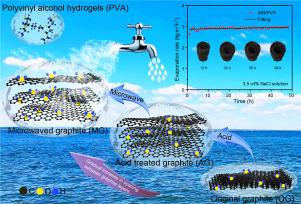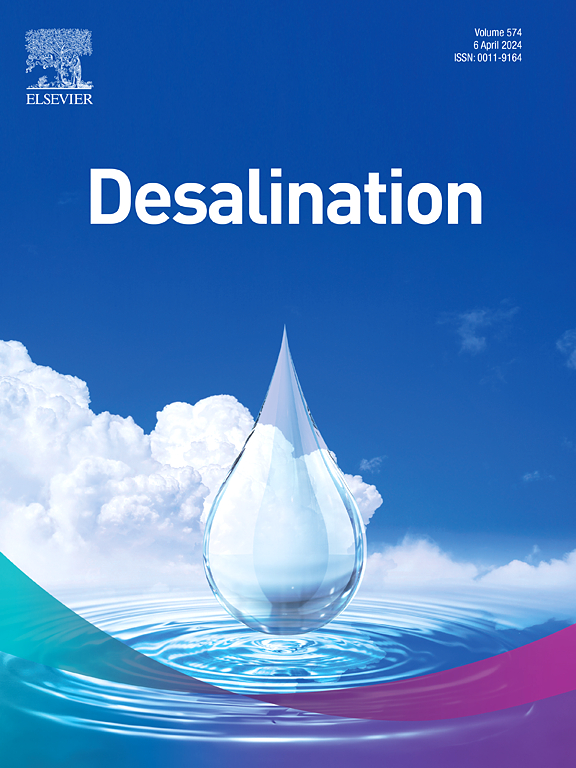Microwave-treated layered graphite for highly efficient solar-powered seawater desalination and wastewater treatment
IF 8.3
1区 工程技术
Q1 ENGINEERING, CHEMICAL
引用次数: 0
Abstract
In the midst of the global water crisis, the ‘waste-to-treasure’ strategy, which includes desalination and wastewater recycling, is proving to be a promising approach. However, existing solar evaporators are hampered by challenges such as low photothermal conversion efficiency and significant heat losses. Here, we present an innovative solution that reduces the band gap of the material and improves the efficiency of light recycling. As a result, the microwave-treated graphite achieves a 15 % reduction in reflectivity and a 9 °C increase in surface temperature. In addition, the integration of this graphite with a hydrogel to modulate the interfacial wettability further optimizes the evaporation efficiency. When exposed to sunlight, the developed cone column evaporator achieves an impressive evaporation rate of 2.91 kg m−2 h−1, which is a significant increase of 663 % over the natural evaporation rate of a 3.5 wt% NaCl solution. Remarkably, no salt deposits were observed on the surface of the evaporator during the tests and the material exhibited excellent adsorption and desorption properties for pollutants, highlighting its potential for sustainable applications. These results provide valuable theoretical and practical insights for the design and development of high-efficiency solar evaporators.

用于高效太阳能海水淡化和废水处理的微波处理层状石墨
在全球水危机的背景下,"变废为宝 "战略(包括海水淡化和废水回收利用)被证明是一种前景广阔的方法。然而,现有的太阳能蒸发器存在光热转换效率低、热损耗大等问题。在这里,我们提出了一种创新的解决方案,它可以减小材料的带隙,提高光回收利用的效率。因此,经过微波处理的石墨的反射率降低了 15%,表面温度提高了 9 °C。此外,将这种石墨与水凝胶结合以调节界面润湿性,还进一步优化了蒸发效率。当暴露在阳光下时,所开发的锥柱蒸发器的蒸发率达到了惊人的 2.91 kg m-2 h-1,比 3.5 wt% NaCl 溶液的自然蒸发率显著提高了 663%。值得注意的是,在测试过程中,蒸发器表面没有观察到盐沉积物,而且这种材料对污染物具有极佳的吸附和解吸性能,突出了其可持续应用的潜力。这些结果为设计和开发高效太阳能蒸发器提供了宝贵的理论和实践启示。
本文章由计算机程序翻译,如有差异,请以英文原文为准。
求助全文
约1分钟内获得全文
求助全文
来源期刊

Desalination
工程技术-工程:化工
CiteScore
14.60
自引率
20.20%
发文量
619
审稿时长
41 days
期刊介绍:
Desalination is a scholarly journal that focuses on the field of desalination materials, processes, and associated technologies. It encompasses a wide range of disciplines and aims to publish exceptional papers in this area.
The journal invites submissions that explicitly revolve around water desalting and its applications to various sources such as seawater, groundwater, and wastewater. It particularly encourages research on diverse desalination methods including thermal, membrane, sorption, and hybrid processes.
By providing a platform for innovative studies, Desalination aims to advance the understanding and development of desalination technologies, promoting sustainable solutions for water scarcity challenges.
 求助内容:
求助内容: 应助结果提醒方式:
应助结果提醒方式:


